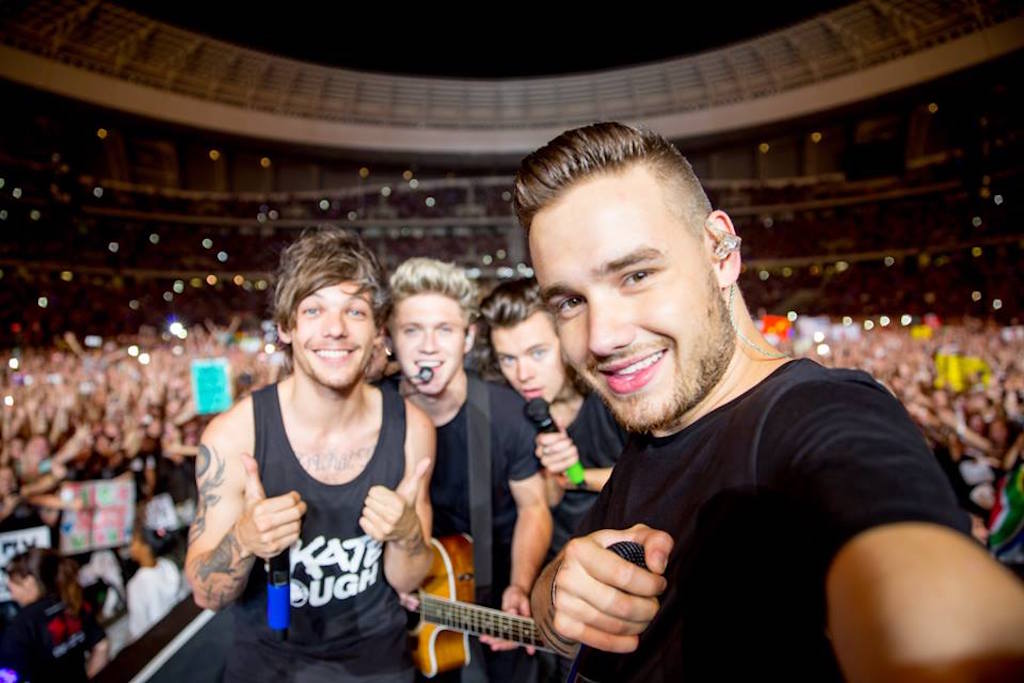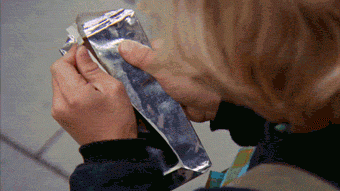In Defence Of Unbridled Enthusiasm (Or That Time I Had An Epiphany At A One Direction Concert)

I presume One Direction concerts are the site of many epiphanies (epiphanies/sexual awakenings, whatever.) I’ve never been a fan of the band, but I also don’t actively dislike them – I don’t eat Vegemite, but I don’t go around slapping those who do, you know? Vegemite has never done anything to offend me. I just don’t have the taste for it.
My friend Brodie does have a taste for it, though. She managed to wrangle a bunch of free tickets to one of One Direction’s Melbourne concerts and offered to take me to the show. “Why not?” I thought. “May get some funny tweets out of it.”
As soon as we got to the concert two things became clear: a) I had never seen a shorter bar line in my whole life, and b) everyone at a One Direction concert acts like they found the last Golden Ticket. Men and women of all ages were swarming around the stadium with these big grins on their faces, exclaiming loudly any time a One Direction song came on over the loudspeaker. People were nervous and excited about this show and they needed literally every person around them to know it. They didn’t need a drink because they were buzzed on fandom and also, many of them were underage.
I’ll be honest: by the time One Direction took the stage, I’d been brainstorming funny observations I could make about the night for about 45 minutes. Because I didn’t really know the songs, I spent most of the set looking around at the crowd, and it dawned on me that I had never seen a happier group of people in my life. Little girls with their mums, trendy women in their twenties who looked like American Apparel ads, boyfriends and girlfriends who stood the entire time and clapped every song, big groups of friends who were laughing and taking each other’s photos, a dad who had packed snacks for his kids. Everyone seemed so grateful to be there.
Then it occurred to me: what am I going to get from shitting all over this? Who am I to shit all over this?
Over the next few days, a few people asked me what the concert had been like, probably expecting that I would tell some snarky story about dumb hairstyles and dumb songs and X Factor or whatever. But I couldn’t do it, because it felt so wrong to make fun of something that people cared about so much. Why did I think that my observations were so witty and perceptive that I needed to express them at the expense of other people? Who made me the fucking final arbiter of taste? One Direction have really good voices and also, four fifths of them are really handsome. Why did I think it was necessary to express any other sentiment, and shame people for liking something just because I didn’t?
Exploring Pop Culture Shame
Pop culture shame transcends music. It’s that TV show you secretly download, hide in a mis-labeled folder and only watch on your laptop. It’s that movie that you ‘hate-watch’ in the cinema, and then buy on DVD so you can cry over it at home. It’s a system of judging people for loving things you think are unworthy of love or, conversely, being scared of this judgement and hiding your fandom. Shaming people for their musical taste is its most common form, maybe because people tend to think there is a much more clear cut ‘right’ and ‘wrong’ taste in music. Everyone has done it though, and everyone has had it done to them.
Making people feel bad for whatever pop culture they’re enthusiastic about comes so naturally that you probably don’t even realise that you do it. It’s different to being critical of something, because we’re not all going to like the same things and it’s pretty boring to pretend otherwise. It’s about being dismissive. There is not a universal marker for GOOD pop culture and BAD pop culture, but there is hierarchy that works through a social currency of ‘coolness’. The internet has democratised taste enough that you will always find a like-minded fan to bond with, but at the same time it has enabled pop culture shamers to mobilise in condemning a thing. And Professor Angela Ndalianis, Head of Screen and Cultural Studies at the University of Melbourne, thinks that online communities may have done more good than harm. “I don’t think it happens as much as it used to – people tend to be more at ease with staking their claim as fans of pop texts,” she says. “Perhaps it’s a carry over attitude that associates fandom with childishness, and a lack of seriousness.”
Let’s get back to Drake for a minute (or for 700 hours, if I had my way). Of all the pop cultural products I like – a list which boasts such artistry as Dawson’s Creek, Little Women and Kim Kardashian – my vocal fandom for Drake is what attracts the most derision from my friends. He’s lame; he’s not a ‘real’ rapper; he was on Degrassi; he wears weird sweaters and writes Instagram poetry – the reasons why I should be ashamed to like him are constantly brought to my attention. And for ages it meant I just didn’t talk about him because I couldn’t be bothered copping heat about it. Do I really need to defend my decision to buy his albums? What makes me less of an expert on ‘quality music’? Even Alexa Chung gets teased about her Drake fandom! By Drake, no less!
Everyone engages in a little self-censorship when it comes to pop culture. It’s like we can intrinsically tell what TV shows or movies or songs people will give us a hard time for liking, whether because it’s tacky or contentious or just not universally acclaimed for being the coolest and best version of its genre. Professor Ndalianis said while she had never felt like she needed to conceal her pop culture tastes, it does depend on avoiding vulnerability. “It’s definitely got something to do with revealing our obsessive love of an object – whether a TV show, film, game, star, etc. — which we tie in so closely to our identity,” she says. “The idea of both our identity and our fan obsession being attacked places us in a vulnerable position.”
Even if the idea that someone will mock the thing you like doesn’t bother you (yeah right, cool guy), you can still be complicit in the cycle of shame, acting like an advocate of the ‘right’ kind of culture and advising people that they’re doing it wrong. When you think about it, is the feeling of superiority you experience when telling someone that The Mindy Project is lame really worth it? Knowing that you’re making someone feel embarrassed, and having dissolved their excitement? What makes you the expert of all things? Is it possible that you just don’t get it, or that it’s not meant for you?
This stance is further complicated when you form a culture crush on something that you know you have admonished in the past. Take for example, the existential crises many people felt when Taylor Swift changed her musical direction, and they started kinda liking her songs.
Professor Ndalianis likens this cultural shift to the growing mainstream fandom of horror texts like The Walking Dead, and shows that would have been considered too weird to openly adore a decade ago. “Horror used to be marginal and fans of horror were seen as ’strange’ or quirky,” she says. “There are still hardcore examples of horror media that are obsessed over and which are marginal and considered ‘wrong’ — mainly because of their challenging content.”
If the thing you secretly like doesn’t become socially acceptable overnight, your choices are to deny it, keep it secret or just live your life and ignore the haters (is that a Taylor Swift lyric? Please advise). When you make fun of your friends for liking dorky things you paint yourself into a corner. You think they’ll be so forgiving when they see your Murder She Wrote box set? When you decide you can’t possibly like anything that isn’t cool, you end up missing out on things: you’re creating an ideal self who has to perform coolness even in private.
I’m still not a One Direction fan, but I am not a hater. You know how remarkable it is to be in a stadium of people singing all the words to all their songs, while listening to your mate narrate the concert with biographical info and performative spoilers (e.g. “This is the part of the song where Niall grabs his junk and everyone goes mental”)? You know how weirdly moving it is to see people get so excited about something — some of them so young that they have never been told to dial back their enthusiasm before — and almost feel jealous because you wish you could un-self consciously like something that much? It’s really something.
Caring about stuff will just always be so much more fun.
–
Sinead Stubbins is a writer from Melbourne who has done stuff for Yen, frankie, Smith Journal and Elle. She tweets about Drake, Gilmore Girls and cheeseburgers at @sineadstubbins

